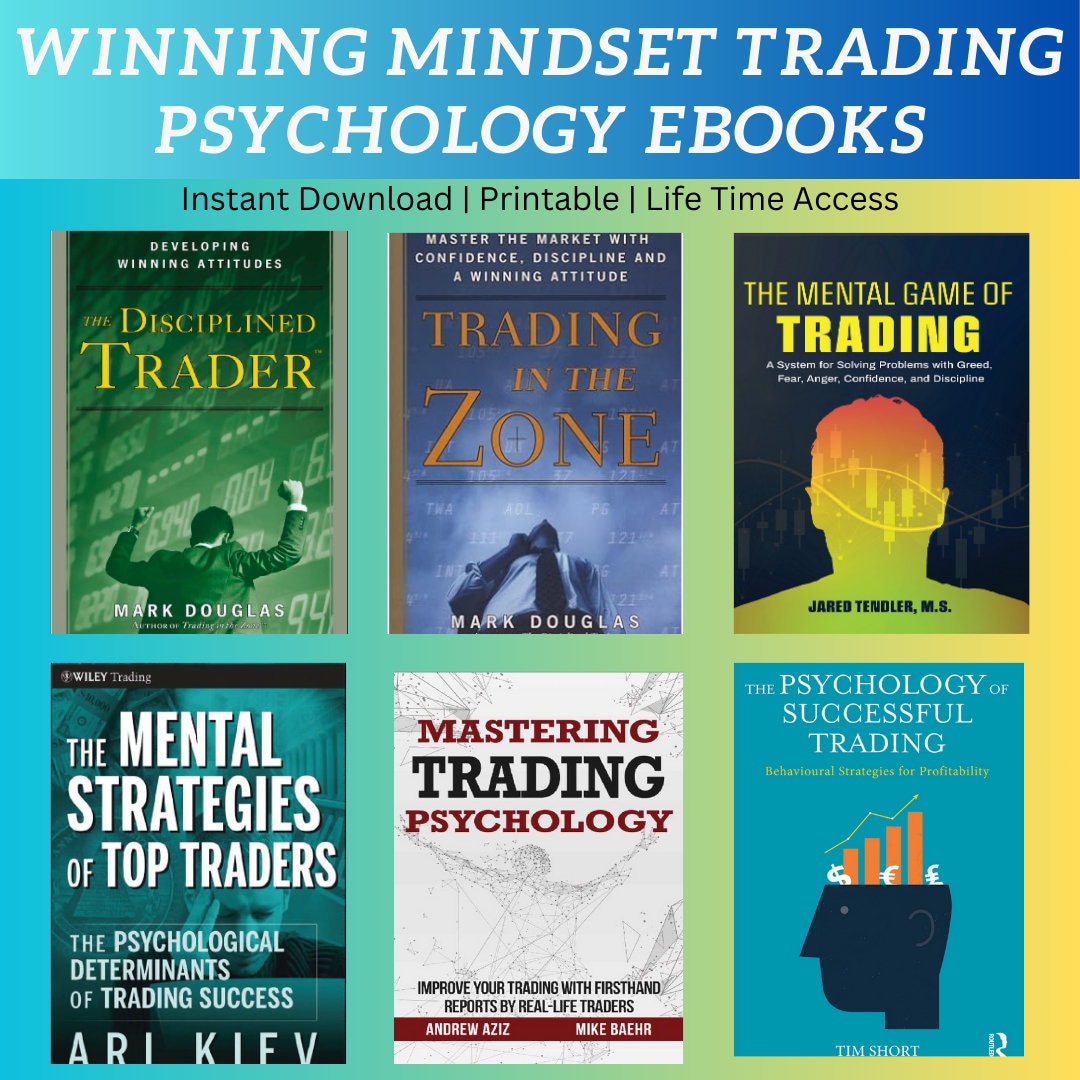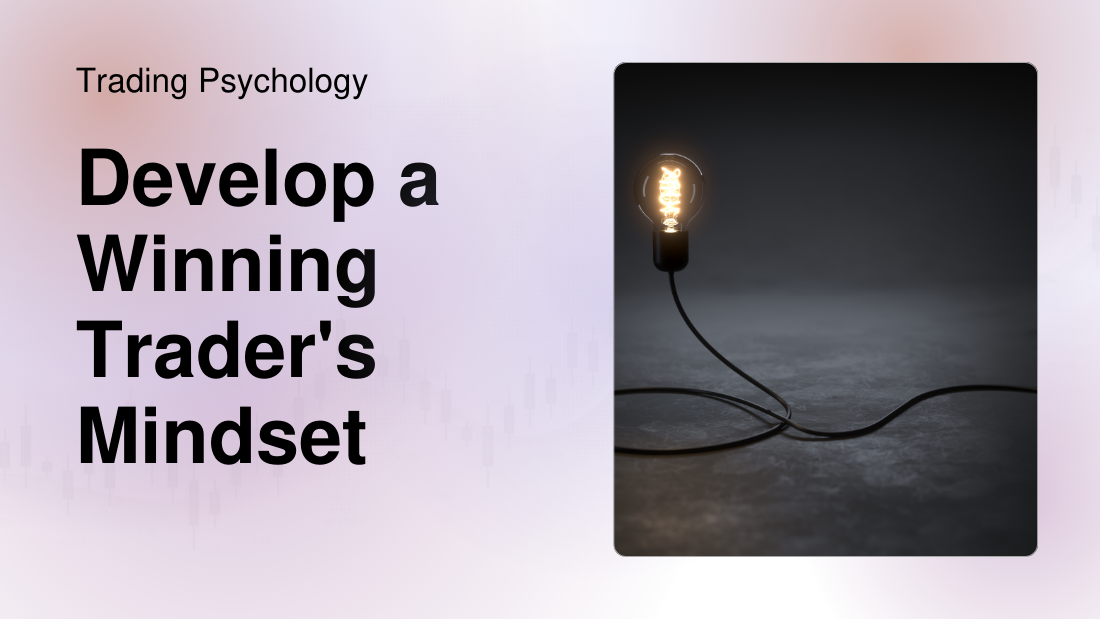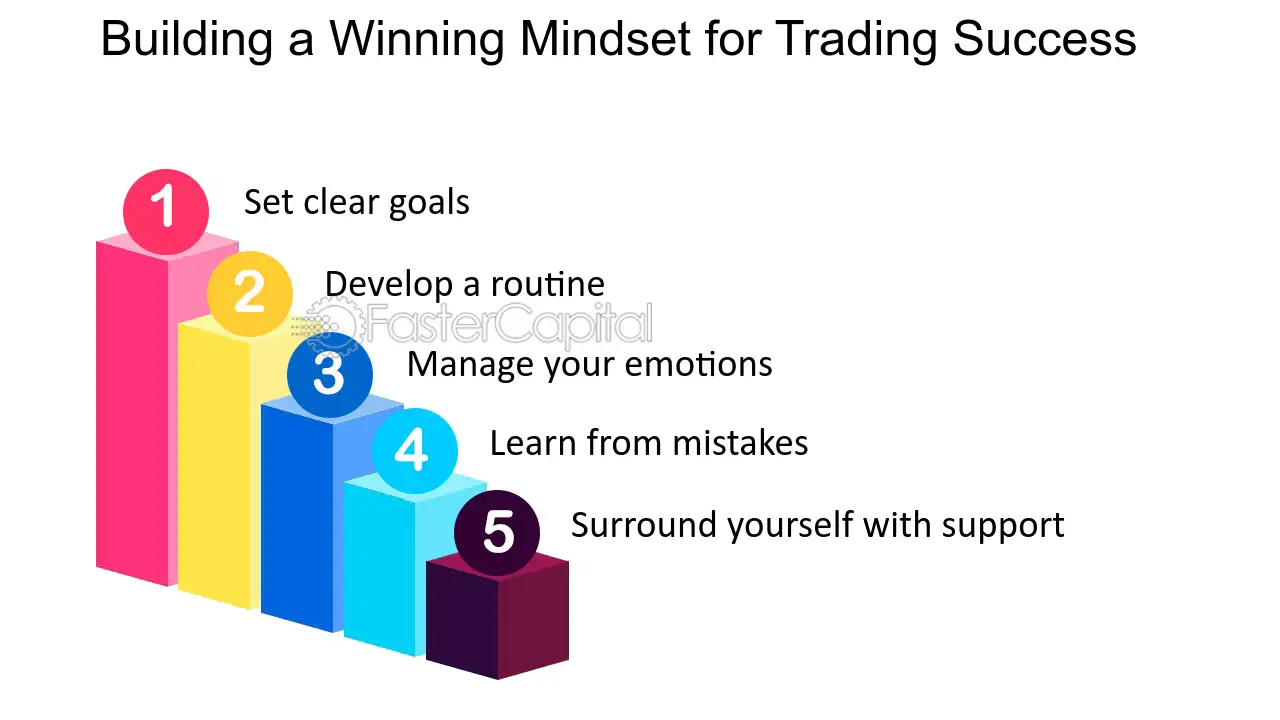When you dive into the world of trading, it’s easy to get caught up in the numbers, charts, and analysis. But the real challenge lies in something far less tangible: your mindset. Without a solid mental foundation, even the best strategies can falter. That’s why understanding how to develop a winning trading mindset is crucial for any trader—whether you’re just starting or have years of experience under your belt.
The problem is simple: many traders focus heavily on techniques and ignore the mental hurdles that inevitably pop up during their journey. Emotions like fear, greed, and frustration can cloud your judgment and lead to costly mistakes. In fact, a trader’s mindset often determines whether they’ll succeed in the long run, or fall victim to the volatility of the market.
So how do you tackle this? How can you build a mindset that keeps you calm, collected, and consistently profitable? The answer lies in mastering emotional discipline, setting clear goals, and building a resilient, patient attitude. If you can do this, the sky’s the limit.
Here’s what you’ll learn in this article:
- Why emotional discipline is the backbone of trading success
- How to manage fear and greed effectively
- Setting clear goals and developing a plan that works
- How to cultivate patience and resilience in a volatile market
- The importance of ongoing learning and mindset adjustment
By the end of this article, you’ll have a roadmap to not only improve your technical skills but also sharpen your psychological edge in trading. Let’s get started.
The Importance of Mental Discipline in Trading
When we talk about a “winning trading mindset,” we’re referring to the mental habits and psychological strength that allow you to make logical decisions, stay disciplined, and push through tough market conditions. But why does mental discipline matter so much in trading?
It’s simple: the market doesn’t care about your emotions. Whether you’re in a winning or losing streak, the market will move based on economic factors, news, and data, not based on how you feel. However, your emotions play a huge role in how you react to these market movements. If you let fear take over, you might exit a trade too early or avoid taking opportunities altogether. On the other hand, letting greed take the wheel could lead to overtrading and poor risk management.
What’s the key to managing this? Emotional discipline. It’s the ability to control your impulses and make decisions based on logic, not feelings.
What is a Winning Trading Mindset?
A winning trading mindset is the ability to stay calm, focused, and objective in both good and bad trading situations. It’s about being able to control your emotions, trust your strategy, and be patient enough to let your trades unfold as they will. Here’s a quick breakdown of the key elements of a winning mindset:
- Emotional control: Managing emotions like fear and greed to make rational decisions.
- Consistency: Sticking to your strategy and trading plan no matter the circumstances.
- Patience: Waiting for the right setups and not forcing trades.
- Adaptability: Learning from your mistakes and adapting your mindset and strategies accordingly.
Think of it this way: your trading strategy is like the map to your destination, and your mindset is the vehicle that gets you there. Without a well-maintained vehicle, even the best map won’t help you reach your goals.
Why Emotional Discipline Matters
Emotional discipline is the foundation of trading success. It’s the ability to step back and make decisions based on logic and analysis, rather than being swept away by the emotional highs and lows of trading. In fact, one of the biggest challenges traders face is managing their emotions effectively, especially in a volatile market.
Let’s be honest: trading is full of ups and downs. One day you’re riding high, making profits, and the next, you’re dealing with a loss. But the key to consistent success is not letting these fluctuations affect your decisions. If you’re constantly reacting emotionally to every market movement, you’re likely to make impulsive decisions that hurt your portfolio in the long run.
Instead, you need to embrace emotional discipline. Here’s how to do it:
- Recognize and acknowledge your emotions: The first step to controlling your emotions is understanding them. When you feel fear or excitement, recognize it and take a step back.
- Develop a structured routine: Consistency helps to reduce emotional volatility. Having a routine can help you maintain focus and avoid impulsive decisions.
- Take breaks when needed: Sometimes, the best thing you can do is step away from the screen. A break can help clear your mind and reduce the chances of making an emotional decision.
By staying emotionally disciplined, you’ll be able to stick to your plan and avoid the emotional traps that can derail your trading success.
Mastering Emotional Discipline
Let’s dig deeper into how you can master emotional discipline. It’s not just about “calming down” when things go wrong—it’s about creating habits that allow you to perform at your best, no matter the situation. Think of emotional discipline as a muscle—it gets stronger the more you work on it.
Understanding Fear and Greed in Trading
Fear and greed are the two most common emotions that cloud a trader’s judgment. These emotions are natural, but they can lead to poor decisions if not managed properly.
Fear: Fear can cause a trader to close a position prematurely or avoid taking a trade altogether. Fear of loss often leads traders to act irrationally, like exiting a trade too soon or failing to trust a well-thought-out strategy.
Greed: Greed, on the other hand, can make you overestimate the potential of a trade, causing you to take excessive risks. It can also lead to overtrading—entering too many trades with the hope of maximizing profits.
So, how do you deal with these emotions? The first step is to acknowledge them. Once you’re aware of the fear or greed creeping in, you can use your training and strategy to push those emotions aside. This is where having a well-defined trading plan becomes so important.
Remember, no trade is worth jeopardizing your mental peace. Stick to your strategy and make decisions based on your plan, not on your emotions.
The Role of Mindfulness in Trading
Mindfulness is a powerful tool for developing emotional discipline. It’s about staying present and being aware of your thoughts and emotions without being consumed by them. In trading, mindfulness helps you stay focused on the process and not get lost in the outcome of any single trade.
Practicing mindfulness can help you detach from the emotional ups and downs of trading and make decisions based on logic. Techniques like meditation, breathing exercises, and even journaling can be helpful in clearing your mind and reducing stress levels.
Overcoming the Emotional Rollercoaster of Losses
Losses are inevitable in trading. It’s part of the game. But how you handle those losses will determine your success in the long run. If you let a loss affect you emotionally, it can lead to a downward spiral of poor decisions. The key is to view losses as learning opportunities.
Instead of getting frustrated or angry, take a step back and analyze what went wrong. Ask yourself:
- Did I follow my strategy?
- Was there a flaw in my analysis or trade plan?
- How can I improve next time?
By focusing on learning from your losses, you’ll build resilience and develop a mindset that stays calm and objective, even in the face of adversity.

Setting Clear Goals and Following a Plan
Another essential aspect of developing a winning trading mindset is setting clear, achievable goals. Without a clear direction, you can easily become distracted or discouraged when things don’t go as planned. Here’s how you can set the right goals and stick to your plan:
The Power of Goal-Setting for Traders
Goal-setting provides direction and motivation. It’s not enough to just want to “make money”—you need specific, measurable goals that guide your actions. Your goals should be realistic, but also challenging enough to keep you motivated. For example, set goals like:
- “I want to achieve a 5% return on investment this month.”
- “I will make five trades this week based on my strategy, no more, no less.”
By having clear goals, you can measure your progress and stay focused on what’s truly important in your trading journey.
Creating a Trading Plan that Works
A trading plan is your roadmap to success. It outlines your strategy, risk management rules, and criteria for entering and exiting trades. Without a plan, it’s easy to get caught up in the chaos of the market and make emotional decisions.
Here’s how you can create a trading plan that works:
- Define your strategy: What type of trader are you? Are you day trading, swing trading, or scalping?
- Risk management: Set stop-loss levels, position sizes, and determine how much you’re willing to lose on each trade.
- Entry and exit criteria: Define when you’ll enter a trade and when you’ll exit, whether you’re in profit or loss.
By sticking to your trading plan, you’ll avoid impulsive decisions and stay focused on the long-term goal: consistent profits.
Staying Consistent with Your Strategy
Consistency is the key to trading success. It’s easy to get distracted by market noise or chase after the next “big opportunity,” but consistency keeps you on track. The most successful traders are the ones who follow their plans, day in and day out, without getting sidetracked by fleeting emotions.
Consistency doesn’t mean being rigid; it means trusting your strategy and making small adjustments as needed based on real-world experiences. It’s about trusting the process and staying disciplined.

Managing Risk and Developing Patience
One of the most essential components of a winning trading mindset is learning how to manage risk effectively. No matter how well you analyze the market, there’s always some uncertainty involved. Managing risk isn’t about avoiding losses—it’s about minimizing their impact and being prepared for the worst-case scenario.
The Role of Risk Management in Developing a Winning Mindset
Risk management is crucial because it helps protect your capital, which is the foundation of your trading career. Without proper risk management, a few bad trades can wipe out your entire account. By using techniques like stop-loss orders and proper position sizing, you can limit potential losses and maintain your mental calm during tough times.
Think about it: would you feel more confident if you knew that even if a trade went against you, you wouldn’t lose more than a small percentage of your total capital? That’s the power of risk management. It allows you to stay in the game longer, with a clear mind, no matter what happens in the market.
The Value of Patience in Trading
Patience is one of the most underappreciated traits of a successful trader. It’s tempting to jump into trades at the first sign of movement or to “force” a trade when the conditions aren’t right. However, successful traders know that waiting for the right opportunities is often the best strategy. By being patient, you allow the market to present clear setups that align with your strategy.
Here’s a personal example: in my earlier trading days, I often jumped into trades too quickly, convinced that I was going to miss out on big moves. More times than I care to admit, I ended up taking losses because I wasn’t waiting for the ideal conditions. Now, I’ve learned the importance of patience. Waiting for setups that meet my criteria helps me trade with confidence, rather than feeling rushed or emotional.
Remember: the market will always be there, and there’s no rush. Patience can help you avoid impulsive decisions and increase your chances of success in the long run.
Building Resilience for Long-Term Success
Trading is a marathon, not a sprint. Developing resilience means being able to handle setbacks, stay focused after losses, and continue improving over time. Resilient traders don’t give up after a string of losses or allow themselves to be swayed by temporary emotions. Instead, they view setbacks as opportunities to learn and grow.
Resilience in trading involves maintaining a positive mindset even when things aren’t going your way. For example, after a loss, a resilient trader doesn’t dwell on the mistake. Instead, they analyze what went wrong, make adjustments, and move forward with an even stronger commitment to their plan.
Here’s a quick tip: keep a trading journal where you document your trades, the rationale behind each one, and the emotions you experienced. Over time, you’ll be able to identify patterns in your behavior and mindset that will help you build resilience and avoid repeating past mistakes.

Continuing to Learn and Improve Your Trading Mindset
The world of trading is always evolving, and the best traders are the ones who continuously improve their skills and mindset. This means that developing a winning trading mindset is an ongoing process—there’s always room for growth. Let’s explore how you can keep learning and refining your mental approach to trading.
The Importance of Ongoing Education for Traders
Just as you never stop learning new trading strategies, you should also continuously improve your mindset. Reading books, attending webinars, and listening to podcasts are excellent ways to keep sharpening your mental tools. Additionally, learning about the psychological aspects of trading, such as cognitive biases or behavioral finance, can help you understand why you think and act the way you do in the market.
Personally, I’ve found that the more I educate myself about the psychological side of trading, the better I’m able to control my emotions and reactions. It’s not just about understanding market trends—it’s about understanding yourself as a trader and how you respond to those trends.
Learning from Other Successful Traders
One of the most valuable resources you have as a trader is the experience of others. Successful traders often share their insights, strategies, and mindset through books, blogs, or social media. By learning from those who have already walked the path, you can avoid common pitfalls and accelerate your own growth.
I recommend finding a few mentors or traders you respect and following their work. Pay attention to how they approach their trades, manage their risk, and, most importantly, how they maintain their mindset during challenging times. By observing others, you can gain new perspectives and ideas that you can incorporate into your own trading journey.
Staying Updated on Market Trends
Market conditions change, and staying informed is crucial to adapting your mindset. For example, in times of market volatility, fear and uncertainty can easily take over. However, staying updated on market news and trends can help you make informed decisions, reducing emotional responses and allowing you to stick to your plan.
It’s also important to remember that the market will go through cycles—bull markets, bear markets, and everything in between. Developing a mindset that can thrive in any market condition is one of the keys to long-term success. Whether the market is up or down, your mindset should remain steady and focused on your plan.

FAQ
What is the most important aspect of a trader’s mindset?
The most important aspect of a trader’s mindset is emotional discipline. Without the ability to control emotions like fear and greed, even the best trading strategy can fail. Emotional discipline ensures you make decisions based on logic and analysis, rather than reacting impulsively to market movements.
How can I control my emotions while trading?
One of the best ways to control your emotions is through mindfulness and meditation. These techniques help you stay present and calm, reducing the influence of fear and greed. Additionally, having a clear trading plan with defined rules can help you stay objective and stick to your strategy, no matter the market conditions.
Why is risk management so crucial for mental discipline?
Risk management is crucial because it allows you to trade with confidence, knowing that your losses are limited. This reduces anxiety and prevents emotional reactions like panic selling or overtrading. When you know your risk is controlled, it’s easier to stay calm and focused, even in volatile market conditions.
How can I stay patient in a volatile market?
Patience in a volatile market comes from sticking to your strategy and not chasing quick profits. Trust your analysis and wait for the right setups to appear. It’s also helpful to remember that the market will always present new opportunities—there’s no need to force a trade when it’s not the right time.
How do I build resilience in trading?
Building resilience involves learning from your mistakes and maintaining a positive outlook. Instead of getting discouraged after a loss, take the time to analyze what went wrong and how you can improve. Keeping a trading journal and reflecting on your trades can help you bounce back stronger and avoid making the same mistakes again.
Epic Takeaway
Developing a winning trading mindset isn’t an overnight process. It requires consistent effort, self-awareness, and the ability to learn from both your successes and failures. By mastering emotional discipline, setting clear goals, managing risk, and staying patient, you’ll be on your way to achieving long-term success in trading.
Remember, trading is just as much about your mental approach as it is about strategy. Cultivate a mindset that is focused, disciplined, and resilient, and you’ll find that success in the market becomes much more attainable.
So, what’s the next step? It’s time to put what you’ve learned into practice. Start by reflecting on your own mindset and identifying areas where you can improve. The road to success in trading is long, but with the right mindset, you can navigate it with confidence and clarity.
